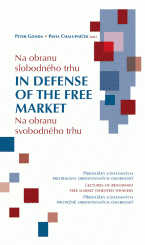 |
|||||||
| INSTITUTE | CONSERVATISM | M.R.STEFANIK |
| NEWS
|
[25.07.2005, Martina Jurinová, NEWS]
Dostál spoke to The Slovak Spectator on July 20. The Slovak Spectator (TSS): As the author of the text protesting against the approval of the EU Constitutional Treaty in parliament, can you briefly explain the main reasons for this initiative? Ondrej Dostál (OD): The main reason for the complaint to the Constitutional Court is to gain a legally binding answer to the question of whether approving the EU Constitutional Treaty would also mean Slovakia's entry to a state bond with other states. If that were the case, then the approval of the EU Constitutional Treaty would have to be decided in a national referendum. We consider the fact that it did not take place in Slovakia to be a breach of our right to participate directly in the administration of public affairs. TSS: Is it your ultimate aim that a referendum be held on this issue? OD:The main goal of the initiative against the European Constitution is to prevent its passage. The actual reason for the constitutional complaint is to make sure that in approving the EU Constitutional Treaty the Constitution of the Slovak Republic is adhered to. We are not asking the Constitutional Court to order the organization of a referendum. We just want the court to state that should the EU Constitutional Treaty be passed in Slovakia, than that can only be done through a constitutional law that would be confirmed by a referendum. TSS: Opinion polls in the past have shown that most Slovaks would most likely agree with the EU Constitutional Treaty. OD: The polls also showed, however, that more people preferred to have a decision achieved on this issue through a referendum rather than parliament. A country's entry to [another] state union is such a principal issue that rather than people's representatives [MPs], the people themselves should make the decision. We are against [this entry], but the people should be allowed to decide on it, as the Slovak Constitution says. TSS: Do you think that the failure to approve the EU Constitutional Treaty in states such as France, could have an impact on the possible referendum in Slovakia? OD: No direct impact. The themes of discussion about the EU Constitutional Treaty and the arguments for and against it are different in each country. However, an important factor could be the realization of the fact that the people do not have to blindly accept everything that the political elites present to them. If a referendum were held, there would definitely be more discussion about the EU Constitutional Treaty and the people would gain more information about it. Although after the negative results of the referenda in France and The Netherlands it would be much more reasonable to stop the whole ratification process and throw the EU constitution in a bin. TSS: So what is your general opinion about the EU Constitutional Treaty? Is the document at all needed in the EU? OD: A constitution requires a state, and we do not want the EU to turn into a state. The euro-constitution represents an important step on the EU's road to one and ever stronger centralized super state. The EU definitely does not need a constitution. The EU needs principal reforms. I fully agree with Czech President Václav Klaus who is calling for a new definition of European integration. The EU should not be a single state but a union of states that cooperate voluntarily and is mutually advantageous. Interview was published in the Slovakia`s English-language weekly The Slovak Spectator. |
 English | Slovak
English | Slovak
This website was created also thanks to funding granted by The Trust
for Civil Society in Central and Eastern Europe.
Website powered by Metafox CMS from Platon Group.
|
Conservative Institute of M. R. Stefanik |
Tel.:
+421 258 100 188 |


 Dostál says that by ratifying the treaty parliament breached citizens' rights. He is a member of an initiative against the EU Constitutional Treaty and thinks that after the failed referenda in France and The Netherlands the whole document should actually be binned and the ratification process stopped.
Dostál says that by ratifying the treaty parliament breached citizens' rights. He is a member of an initiative against the EU Constitutional Treaty and thinks that after the failed referenda in France and The Netherlands the whole document should actually be binned and the ratification process stopped.





